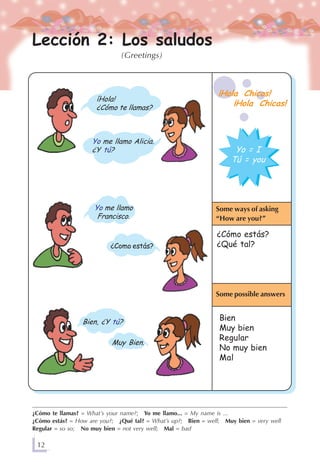
Saludos y presentaciones
- 1. Lección 2: Los saludos (Greetings) ¡Hola Chicos! íHola! ¿Cómo te llamas? ¡Hola Chicas! Yo me llamo Alicia. ¿Y tú? Yo = I Tú = you Yo me llamo Some ways of asking Francisco. “How are you?” ¿Cómo estás? ¿Como estás? ¿Qué tal? Some possible answers Bien, ¿Y tú? Bien Muy bien Regular Muy Bien. No muy bien Mal ¿Cómo te llamas? = What’s your name?; Yo me llamo... = My name is ... ¿Cómo estás? = How are you?; ¿Qué tal? = What’s up?; Bien = well; Muy bien = very well Regular = so so; No muy bien = not very well; Mal = bad 12 02 Lesson2 p12_15.pm7.pmd 12 11/10/2003, 5:52 PM
- 2. ¡Vamos a practicar! Look at the conversation between Alicia y Francisco, and practice it with your partner. a) Ask his or her name, and say yours. b) Then, ask how he/she is, and tell how you are. Look at the different options on the previous page: bien, muy bien, regular, mal... You can also add these ones (they all mean “great!“): ¡fantástico! ¡extraordinario! ¡super! ¡Buenos días! ¡Buenas tardes! ¡Buenas noches! De noche De mañana (in the (in the morning) De tarde evening, or at (in the night) se dice... (we say, or afternoon) se dice... people say) se dice... ¡Buenos días! ¡Buenas tardes! ¡Buenas noches! 13 02 Lesson2 p12_15.pm7.pmd 13 11/10/2003, 5:52 PM
- 3. Preguntas y Respuestas (Questions and Answers) ¿Qué decimos a la maestra? ¿al maestro? (What do we say) (to the teacher-she) (to the teacher-he) Buenos días, señora (Mrs.) Buenos días, señor (Mr.) Buenos días, señorita (Miss.) Now you know two words to ask questions: ¿cómo...? and ¿qué...? Do you remember what these questions mean? ¿Cómo se dice? ¿Qué decimos? ¿Cómo estás? ¿Cómo te llamas? ¿Qué tal? ¡Vamos a practicar! Working with a partner, put the two columns together. For example: Estudiante 1: ¿Qué se dice de tarde? Estudiante 2: Buenas tardes 1. Hola, ¿Cómo estás? a. Buenos días, señora 2. Hola. ¿Cómo te llamas? b. Buenas tardes 3. Buenos días, chicos. c. Regular 4. ¿Qué tal? d. Patricia 5. ¿Qué se dice de mañana? e. Buenos días 6. ¿Qué se dice de tarde? f. Bien, ¿Y tú? ¡A PRONUNCIAR! Las letras “ll” - “ñ” You were using the words Me llamo, Te llamas... and you pronounced the letter “ll” like “y” Also, you said niño, mañana, señor, español... and you pronunced the letter ñ like the English “onion” Now, try the following palabras (words): 1. bello (beautiful) 2. calle (street) 3. silla (chair) 4. sillón (armchair) 5. baño (bathroom, bath) 6. llama (lama) 7. llaves (keys) 8. lluvia (rain) 9. apellido (last name) 10. montaña (mountain) 11. cabaña (cabin) 12. cañón (canion) 13. años (years) 14. araña (spider) 15. moño (bow) 14 02 Lesson2 p12_15.pm7.pmd 14 11/10/2003, 5:52 PM
- 4. ¿Él habla español? y ¿ella habla español? Él = He Ella = She Look at the map. The countries colored in orange are Spanish speaking countries. Can you answer the questions with Sí (yes) or No? España Islas Baleares Islas Canarias Cuba México República Guatemala Dominicana Honduras Jamaica Puerto Rico El Salvador Venezuela Nicaraqua Costa Rica Panamá Brasil Colombia Ecuador Perú Bolivia Paraquay Uruguay Chile Argentina OCÉANO OCÉANO PACÍFICO ATLÁNTICO ¡Atención! Yo me llamo ...(name) Él or Ella se llama …(name) No Sí Se llama Roberto. Él es de Chile. ¿Habla español? Se llama Lurdes. Ella es de Brasil. ¿Habla español? Se llama Elisa. Ella es de Argentina. ¿Habla español? Se llama Raquel. Ella es de Honduras. ¿Habla español? Se llama Jackeline. Ella es de Jamaica. ¿Habla español? Se llama Luis. Él es de Perú. ¿Habla español? 15 02 Lesson2 p12_15.pm7.pmd 15 11/10/2003, 5:52 PM
